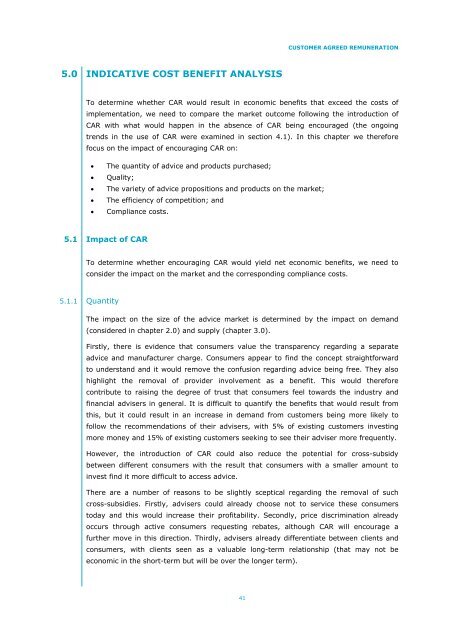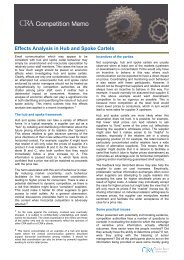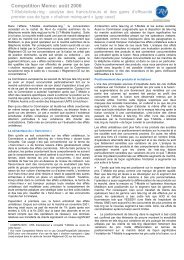CUSTOMER AGREED REMUNERATION - CRA International
CUSTOMER AGREED REMUNERATION - CRA International
CUSTOMER AGREED REMUNERATION - CRA International
You also want an ePaper? Increase the reach of your titles
YUMPU automatically turns print PDFs into web optimized ePapers that Google loves.
5.0<br />
5.1<br />
5.1.1<br />
INDICATIVE COST BENEFIT ANALYSIS<br />
<strong>CUSTOMER</strong> <strong>AGREED</strong> <strong>REMUNERATION</strong><br />
To determine whether CAR would result in economic benefits that exceed the costs of<br />
implementation, we need to compare the market outcome following the introduction of<br />
CAR with what would happen in the absence of CAR being encouraged (the ongoing<br />
trends in the use of CAR were examined in section 4.1). In this chapter we therefore<br />
focus on the impact of encouraging CAR on:<br />
• The quantity of advice and products purchased;<br />
• Quality;<br />
• The variety of advice propositions and products on the market;<br />
• The efficiency of competition; and<br />
• Compliance costs.<br />
Impact of CAR<br />
To determine whether encouraging CAR would yield net economic benefits, we need to<br />
consider the impact on the market and the corresponding compliance costs.<br />
Quantity<br />
The impact on the size of the advice market is determined by the impact on demand<br />
(considered in chapter 2.0) and supply (chapter 3.0).<br />
Firstly, there is evidence that consumers value the transparency regarding a separate<br />
advice and manufacturer charge. Consumers appear to find the concept straightforward<br />
to understand and it would remove the confusion regarding advice being free. They also<br />
highlight the removal of provider involvement as a benefit. This would therefore<br />
contribute to raising the degree of trust that consumers feel towards the industry and<br />
financial advisers in general. It is difficult to quantify the benefits that would result from<br />
this, but it could result in an increase in demand from customers being more likely to<br />
follow the recommendations of their advisers, with 5% of existing customers investing<br />
more money and 15% of existing customers seeking to see their adviser more frequently.<br />
However, the introduction of CAR could also reduce the potential for cross-subsidy<br />
between different consumers with the result that consumers with a smaller amount to<br />
invest find it more difficult to access advice.<br />
There are a number of reasons to be slightly sceptical regarding the removal of such<br />
cross-subsidies. Firstly, advisers could already choose not to service these consumers<br />
today and this would increase their profitability. Secondly, price discrimination already<br />
occurs through active consumers requesting rebates, although CAR will encourage a<br />
further move in this direction. Thirdly, advisers already differentiate between clients and<br />
consumers, with clients seen as a valuable long-term relationship (that may not be<br />
economic in the short-term but will be over the longer term).<br />
41




